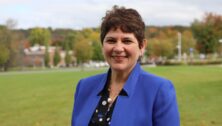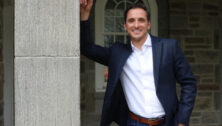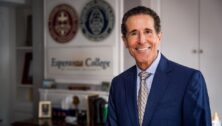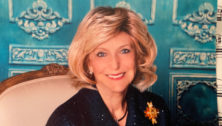Bucks County Leadership: Marta Yera Cronin, President, Delaware County Community College
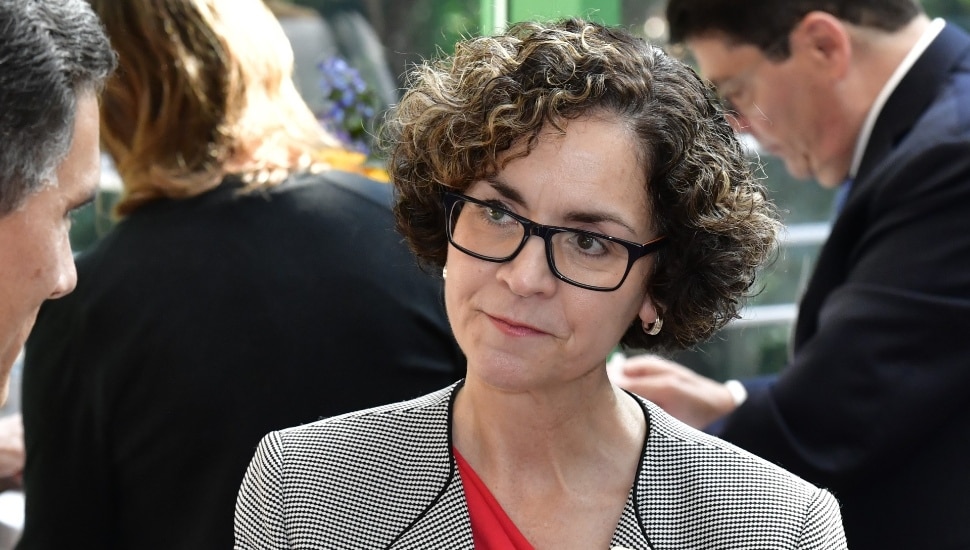
Marta Yera Cronin, President of Delaware County Community College, spoke with BUCKSCO Today about growing up in New York City and Miami as the child of parents who fled Cuba when Castro came into power. From a young age, Cronin loved the study of language, studying French and Russian in college in addition to speaking Spanish and English.
Cronin described how she was offered a job as a middle school reading teacher and realized that she loved teaching teachers how to be more effective educators. She also shared updates on Delaware County Community College’s new campus and her favorite guilty pleasure authors.
Where were you born and where did you grow up?
I was born in Washington Heights, New York City — they made a musical about it! I was raised by a single mother. My parents had come fleeing Castro from Cuba in ‘59.
I have an older brother who is five years older than me. He is the first person in my family to graduate from college only because he’s older than me. I am the first female.
What did your mother and father do?
My father had a sixth-grade education, so he was a butcher. My mom was in banking. She was trying to get a business degree at the Havana Business Institute in Cuba, but she hadn’t finished. So when she came to this country, she was only able to find factory work.
One day she saw a job opening at Chemical Bank, which was a big banking company in New York. The job opening was for someone with experience in the bank’s foreign exchange department. She prepared by learning everything she could about foreign currency and even memorized the exchange rates. She went in there and wowed them. They hired her, and 26 years later, she retired as an Assistant Vice President without ever having a degree. She was a great role model for me.
What do you recall about growing up in Washington Heights?
When I look back, things were so simple. We never really went on vacation. Only the Bradys did that on TV. But I had a very happy childhood where all my friends had what I had. So, there was nothing we ever felt we were lacking. We just played outside a lot and enjoyed the basic pleasures of life.
Did you play any sports when you were growing up?
I did not. I thought that sports weren’t very important. I wish I would have.
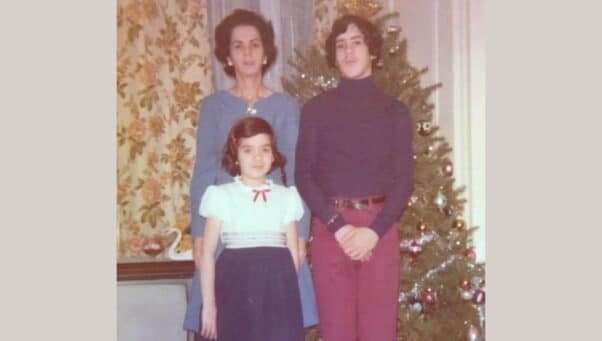
How did you distinguish yourself in high school without playing sports?
I was a member of the National Honor Society and the French club. I loved the study of language.
Did you have any part-time jobs in high school?
My first official job was at Lindsay Lumber, which was the early version of The Home Depot and Lowe’s in Florida. I was a cashier there and also worked part-time at Chemical Bank. I made copies and did other clerical work during the summer, thanks to my mom.
What lessons did you learn from those jobs that stay with you today?
I learned to be responsible. My mom taught us to always get to work on time. If I was supposed to be there, I couldn’t call out to go to the beach or hang out with my friends because I had a responsibility to be there. I also learned about how to manage money; I’ve always been good about that. We never had a lot of money, so when I was earning my own money, it was important to me to be responsible with it and save it.
What kind of music floated your boat growing up?
We listened to a lot of what Cubans call merengue. I liked Motown because my brother used to listen to a lot of that. I can remember listening to a lot of the Bee Gees. Mostly because of the Saturday Night Fever soundtrack.
Did you have a favorite artist?
My favorite artist since high school has always been Sting — back when he was with The Police and then when he went solo. He’s always been my favorite artist because he has morphed into so many different things and plays so many different types of music.
I’m going to assume you were a pretty good student. You could have gone anywhere to college. Where did you end up going?
I went to the University of Miami. My brother went there before me. I had a decent SAT score and good financial aid because of my mom’s income. It was a great opportunity to go to a good school and not have to pay or incur debt.
Is that when you moved to Florida?
My mother moved us to Florida when my brother was in his second year of high school and when I was in sixth grade because when you get to that age, gangs start to come knocking at the door. She didn’t want him to have any part of that. Her sister and my grandmother lived in Miami, so we could be near family there.
Did you look at any other schools?
Not really. It was easy. I didn’t have to leave home — I could commute.
Was the University of Miami a good choice for you?
It was. I had a lot of good instructors in the teacher education program, and it was a good experience for me. Plus, since my brother had gone there before me, he could help me navigate the experience.
Did you get a graduate degree afterward, or did you teach first?
I started teaching. My first teaching job was at a private school. They didn’t have an opening for a French teacher, which is what I was certified to teach. But back then, it didn’t matter so much. The Principal said to me, “I need a middle school reading teacher.”
I love to read. I thought, “Teach reading in middle school? Sure.” Little did I know that all middle schoolers did not know how to read. So, in my first year of teaching, I had to drop my linguistics classes for my master’s degree and take classes on how to teach reading. I took those classes, and I loved the process that we take for granted. It was so amazing to me that I ended up getting a master’s degree in reading.
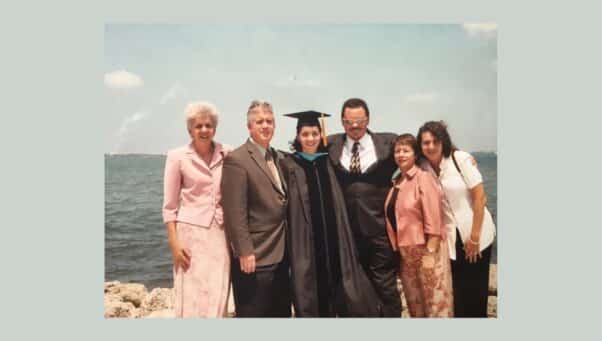
Who were the people who saw promise in you? You were 21 and just coming out of college.
I credit a lot of people along my pathway. That first Principal, America Novas, had faith in me to step into that middle school classroom, even though I wasn’t completely sure I had faith in myself at that moment.
And when teachers who had been teaching for 20 years started coming to me, saying, “We’re hearing this is great stuff. Can you show us?”
This was during my first years of teaching, and they thought I had something I could contribute to them. That started telling me, “You have to continue your education.” After I got my master’s degree in reading, that’s when I decided I needed to teach teachers and went for my doctorate.
What do you think those other teachers saw in you?
Maybe what they had seen in themselves back when they first started teaching — that spark. Since I had taken classes more recently, I was exposed to new things they probably hadn’t been exposed to.
I think that’s what they saw, the potential for them to be better teachers, which thrilled me to help them do that. It was very humbling that they were coming to me.
Who else saw promise in you? Who opened up doors?
I’d say probably when I was a professor. I was teaching at the college level for just over 10 years at the time. It was the person who said to me, “You’re great in the classroom, but you’re destined to have greater influence over this whole thing.” His name is Tony Iacono, and he’s now the President of the County College of Morris in New Jersey. I credit him for dragging me from my somewhat cushy faculty position, where I taught several classes and only had 10 office hours a week, to the dark side, where the hours became 12 or 14 hours daily.
Would you have it any other way?
No. As much as I felt that I reached students in the classroom, when I became a Dean, I was able to reach more students. I was able to impact policy and procedures and help other faculty. Each time I went up, I had a greater potential to impact more people.
Anybody else you want to mention that saw promise in you?
My number one champion was always my mom. She was my role model. She taught me, “Roll up your sleeves. You show them you can do it — they’re not always going to give you the opportunity, but you keep trying until you get it.” I learned that at a very young age from watching her. My brother was also always there to support me every step of the way.
I’d be remiss if I didn’t mention my husband, as well. He met me when I was holding umbrellas over children’s heads at dismissal and supported me every step of the way as I made my way up the ladder. The work to get to where I am today took a lot of time away from my family, and he was always understanding of that and encouraged me to keep moving so that I could do more good and reach more students.
So, how did you get to Delaware County Community College?
My path to a college presidency began when I was the Vice President of Academic Affairs at Indian River State College in Florida. The American Association of Community Colleges has a National Community College Hispanic Council. Every year, they pick 22 Latino leaders throughout the country to be part of this fellowship program. I was part of the fellowship program in 2017. I was assigned a mentor who said, “You need to be a President.” I said, “I just wanted to be a better Vice President.” I did not have President on my radar at all.
He sends me this job description from a small college in rural Oregon, Columbia Gorge Community College. I had never been to Oregon. But it was an HSI, or Hispanic serving institution, and they were still trying to figure out what that meant because, surprisingly to me, there are a lot of migrant workers in Oregon. I applied and got the position in 2018. It was a great experience to go out there, but we were so far from family. Our entire family is on the East Coast.
When I heard about Delaware County Community College’s opening, I researched the institution. I loved all the great things happening with the workforce. They had just opened a center for equity and social justice.
I threw my hat in the ring. I came out for an interview, and when I talked to the people here, I could feel that this was like family to them. This was a place where they came together with their daytime family and made great things happen for students. I thought, “I want to be part of that.”
Tell me about your priorities. What are you focused on as 2024 unfolds?
One of the college’s priorities is our new Upper Darby campus, which is set to open in the fall of 2025. We’re piloting a biomedical technology program there right now, here on the Marple Campus, to ensure that it’s good to go when we move into the building. We have a capital campaign going on, and we continue to obtain grants to support the programs that are going into the new building.
Another priority is having more of a presence in Chester County. We are Delaware County Community College, but we do serve Delaware and Chester County. I think people forget that we’re out there, even though we have two sites in Chester County. We’re looking for a third site in Chester County to offer culinary.
We’re also working on expanding our dual enrollment. In the past, dual enrollment has tended to be mainly academic. I’d like to see more career and technical education. Many students are not necessarily academically inclined, and that’s okay because we need those workers. Many of those occupations are highly skilled jobs that pay well.
We’re also expanding our Center for Equity and Social Justice. We’ve been having a lot of dialogues for diversity and a lot of community events inviting the community in to talk to speakers and learn about cultural things.
Are any new programs coming this year?
With the new building, we’ll have a brand-new culinary wing with a total hospitality program. Right now, we just do culinary in the basement of a church.
The new biomedical technology program that I mentioned is going to be in that building.
We’re working on an AI program for, hopefully, Spring of 2025 before the building opens — just to get our feet wet in that area because AI can go in so many different directions.
What do you do with all your free time?
I can’t wait for spring break next week because I will crack many books for leisure. No textbooks or books about leadership or the future of education. I love Stephen King. He’s my guilty pleasure. I also like John Grisham. Every once in a while, I’ll read a biography or something, but I like to read stuff that takes me away.
I also like to travel. In my home office I have a map of the world with magnetic pins on the countries my husband and I have visited. I believe we are at 31.
Three final questions, Marta. What’s something big you’ve changed your mind about over the last 10 years?
When I was in high school, the people who were going to Miami Dade Community College were the people who we felt couldn’t get in anywhere else. It’s a terrible thing, but as a kid and teenager, that was what I thought. The more I started working with community colleges, I realized right away that this is where I’m meant to be. Some of these students would not have the opportunity were it not for us.
For me, that was a big turn. When I think about that, I feel ashamed that I thought that way. I was 16 or 17 years old, but I felt so foolish. I never mocked anyone or teased them about it, but I thought that.
What keeps you hopeful and optimistic? It’s a crazy world out there.
It is a crazy world. I’m trying to stay hopeful that the next election will result in what the country needs to retain the democracy we have been proud of for centuries. The democracy that has served as an example to other countries.
The kids that I see coming through are stepping up younger than we ever did, and that gives me hope. Leadership wasn’t counted so much when I was in middle and high school. There were just a few people who stood out. Look at these kids who are making a living being influencers online. Who would have thought that was going to happen? I guess the kids keep me hopeful — just the promise for tomorrow.
And hopefully, society will be more open-minded as we get more knowledge and more exposure that a person is a person. We’re all human beings at our core. It’s not about your skin color or your sexual preference or whatever else. It’s who you are as a person.
Finally, Marta, what’s the best advice you’ve ever received?
People assume things before they meet me. I find it interesting that in certain situations, because I’m a Hispanic female, I’m not expected to score as high. But my anatomy teacher in high school said, “Don’t allow people to put you in a box. The only limitations put on you are the ones you put on yourself.”
Someone once told me, “There’s a position opening up for Chief Diversity Officer.” I thought to myself, “I’m going to put myself in a box, and people are going to assume that is what I can do because I’m Hispanic when I can do so much more than that.”
I passed on that opportunity for that reason. I still do have a big impact on DEI efforts because they’re really important to me, but I felt at that moment, at that age, that I would be pigeonholed, and I didn’t want that to happen. I needed to gain more experience in as many areas as possible to set myself up for future success.
Connect With Your Community
Subscribe for stories that matter!
"*" indicates required fields



























